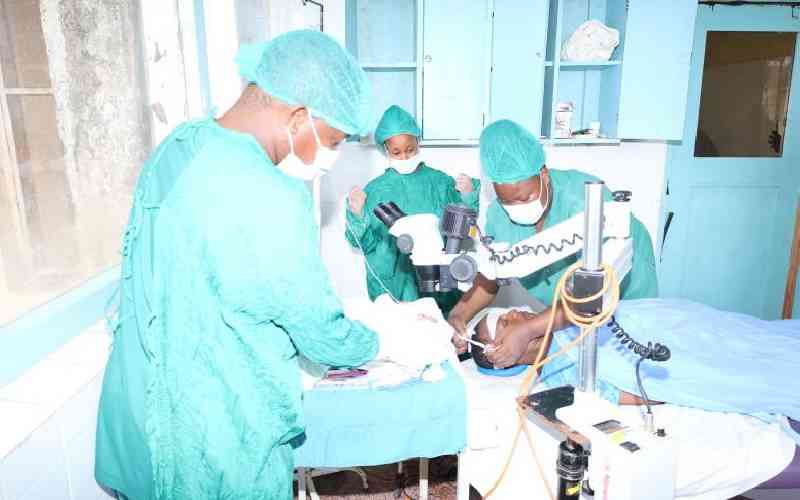
Dr. Geoffrey Anaya with a team of ophthalmic nurses when they conducted an eye surgery at St Luke's Hospital in Kaloleni. [Marion Kithi, Standadard]
Residents of Kilifi County who are living with blindness have been granted vision for life after the Kilifi County Referral Hospital partnered with a charity organisation to help restore their sight.
One such resident is 63-year-old Elias Kahingo, a father of three who lives in Tsangatsini village. Kahingo, who lives with his son Kea, says a cataract developed in one of his eyes, leading to poor vision.
Kahingo gradually developed blindness, which forced him to stop working. He has been blind in both eyes - bilateral cataract - for two years now. As a result, his son Kea had to take over the burden of providing for himself and his father.
In early December last year, Kea got information about an outreach programme for free cataract surgery at St. Lukes Hospital in Kaloleni. He urged his father to sign up for the programme.
At first, Kahingo was skeptical, but he eventually set out on the bumpy two-hour journey, with four of his friends who also suffered from eye diseases.
Kahingo soon went through the operation, which was successfully carried out by a surgeonand a team of ophthalmic nurses from the Kilifi County Referral Hospital (KCRH).
"My life has now been restored," said Kahingo after the procedure.
Like Kahingo, 62-year-old Fatma Mlela from Dangarani village developed cataracts in both her eyes and eventually lost her vision. Unable to continue her work as a farmer, Fatma lived with her children and depended on them for everything.
"I felt that I was a great burden. I had to ask for help for everything, washing, eating...I did notfeel free," she said.
But after a successful cataract operation, Fatma was delighted at the prospect of once again playing an active role in the community.
Kahingo and Fatma are among hundreds of villagers from remote areas of Kilifi who answered the call to undergo free cataract surgery.
The disease is prevalent in the county, and many patients lose their sight as they can not afford basic health care. Data from the Kilifi Department of Medical Services shows at least 100,000 residents suffer from eye-related diseases, with more than 7,999, including children, suffering from blindness.
Cataracts represent 39 per cent of visually impaired patients, while glaucoma comes second at 15 per cent. County Executive Committee Member for Health, Peter Mwarogo, says the eye burden in Kilifi has ended the dreams of many people.
"In places where the margins of survival are thin, the blind are often plunged into greater poverty and even early death. Poor families cannot afford to lose a breadwinner or to feed and care for someone who is helpless. They call it a 'mouth without hands,'" says Mwarogo.
The situation is worse for people who suffer from chronic eye diseases such as glaucoma, caused by damage to the optic nerve. Cataracts happen when the eye lens becomes cloudy, leading to blurred vision and eventual blindness.
According to eye specialists, cataracts are caused by eye injury, inflammation, intense heat exposure, hereditary influences, smoking, intake of certain oral steroids, and diabetes. For children in remote areas, cataracts form as a result of chronic infections and malnutrition.
With limited access to healthcare, medical outreaches are a godsend. Through the outreach at KCRH funded by the Fred Hollows Foundation, the hospital received eye equipment worth Sh7 million, including a theatre microscope.
Dr. Geoffrey Anaya, an eye surgeon at KCRH says through the outreach programme, a total of 940 cataract surgeries were carried out.
"When we started, there was a backlog of cataract blindness in Kilifi. We thought it's going to be alifetime before we get a handle on this. But now we have done over 940 operations," says Dr Anaya.
He says poverty and poor medical care are partly responsible for blindness in the county, leading to bleak prospects for an independent life. But he says he is happy to open the eyes of the blind.
"When the patch comes off, first there's this look of bewilderment, or 'what am I seeing?' And thenrecognition, and then this absolutely pure unadulterated joy," he says. "I never get tired of seeing that. My goal is to lead Kilifi out of darkness, one patient at a time."
Mary Kalu, an ophthalmic nurse at Malindi General Hospital says once someone goes blind, their life expectancy is reduced to about one-third of that of a healthy person. Blindness also takes a person out of the workforce, or a child out of school, to care for the blind person.
"So when we restore sight to a blind person, we are freeing up their family and restoring their life," says Mary. "There is a new thrill when that bandage is taken off and the person sees again for the first time."
 The Standard Group Plc is a multi-media organization with investments in media
platforms spanning newspaper print
operations, television, radio broadcasting, digital and online services. The
Standard Group is recognized as a
leading multi-media house in Kenya with a key influence in matters of national and
international interest.
The Standard Group Plc is a multi-media organization with investments in media
platforms spanning newspaper print
operations, television, radio broadcasting, digital and online services. The
Standard Group is recognized as a
leading multi-media house in Kenya with a key influence in matters of national and
international interest.



